Women need at least 50 grams of protein daily, while men need about 60 grams. This shows how important protein is for health and fitness. For those who want to build lean muscle and boost strength, a high-protein diet is key. It helps improve muscle mass, bone density, and weight management.
High-protein diets can lead to quick weight loss by reducing water retention. They also offer health benefits like increasing muscle mass and aiding in weight loss. Eating foods rich in protein, like lean beef, fish, and dairy, keeps you feeling full. This makes sticking to a high-protein diet easier.
Good high-protein diets include lean protein, veggies, berries, and whole grains. They provide a balanced approach to fitness nutrition. Key foods for a high-protein diet are lean meats, poultry, seafood, beans, and low-fat dairy. Also, eggs, nuts, seeds, berries, and whole grains are great options.
By understanding the benefits of a high-protein diet, you can start working towards your fitness goals. Adding more protein to your diet is a great first step towards better health.
What is a High-Protein Diet?
A high-protein diet focuses on eating lots of protein, making up more than 20% of daily calories. It’s good for those trying to lose weight, build muscle, or get healthier. There are many types, like plant-based and animal-based diets, each with its own benefits.
Some like plant-based protein from foods like legumes and tofu. Others choose animal protein from meat and dairy. Protein shakes are also great for adding protein, perfect for busy people.
Definition and Overview
A high-protein diet means getting 20% or more of daily calories from protein. You can get this by eating foods rich in protein, like lean meats and plant-based options.
Key Characteristics
High-protein diets have a few main points:
- High protein intake: 20% or more of daily calories
- Focus on protein-rich foods: lean meats, fish, eggs, dairy, and plant-based options
- Less carbs and fats: helps with weight loss and energy
- Feeling full: high-protein diets can make you feel more satisfied
For weight loss, high-protein diets are effective. They help cut calories and boost metabolism. By adding plant-based protein, animal protein, and protein shakes to your diet, you can reach your weight loss goals and enhance your health.
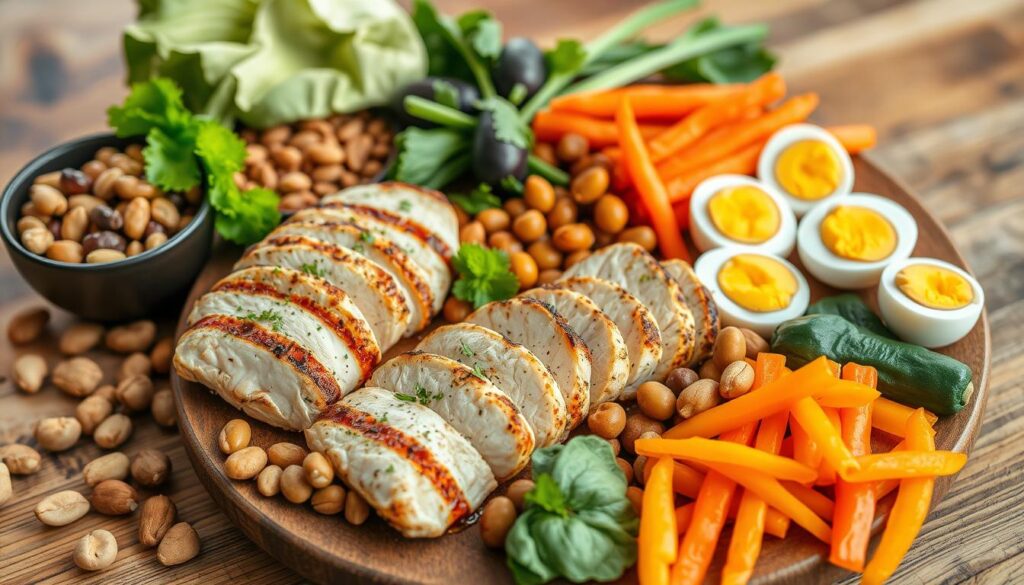
Why Protein is Essential for Fitness
Protein is key for fitness, helping with muscle gain and strength training. When you do strength training, your muscles get tiny tears. Protein is needed to fix and grow them back. This is important for recovery, helping muscles grow and feel less sore.
A good diet with enough protein supports muscle gain and strength. Foods like lean meats, low-fat dairy, and legumes are high in protein. They’re great for a fitness diet. Protein supplements can also help, but eating whole foods is best.
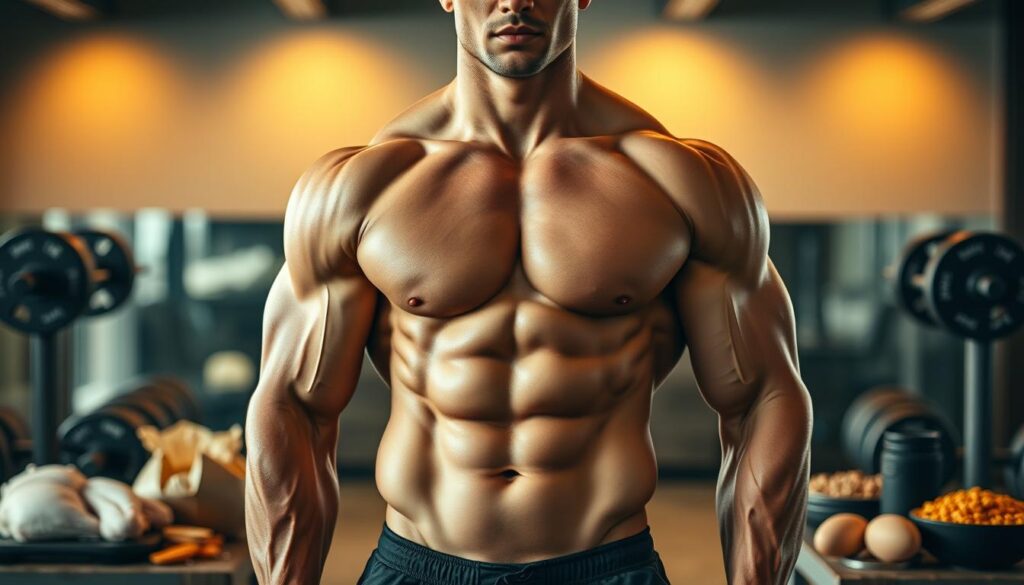
- Supporting muscle growth and repair
- Enhancing workout recovery
- Providing energy for exercise
- Supporting overall health and well-being
Eating protein-rich foods and staying hydrated helps reach fitness goals. It makes your strength training and workouts more effective.
Types of Protein Sources
There are many protein sources to choose from. Animal-based proteins like lean meats, fish, eggs, and dairy are high in protein. For example, a 3-ounce serving of lean beef has 24.6 g of protein. A cup of cottage cheese has 28 g of protein.
Plant-based proteins, such as beans, lentils, tofu, and tempeh, are also great sources. In addition, protein supplements like whey protein, casein protein, and BCAAs can help increase protein intake. Whey protein powder, for instance, has about 16.6 g of protein per scoop.
Protein snacks, such as nuts and seeds, also contribute to daily protein needs. A 1-ounce serving of almonds, for example, has 6 g of protein.
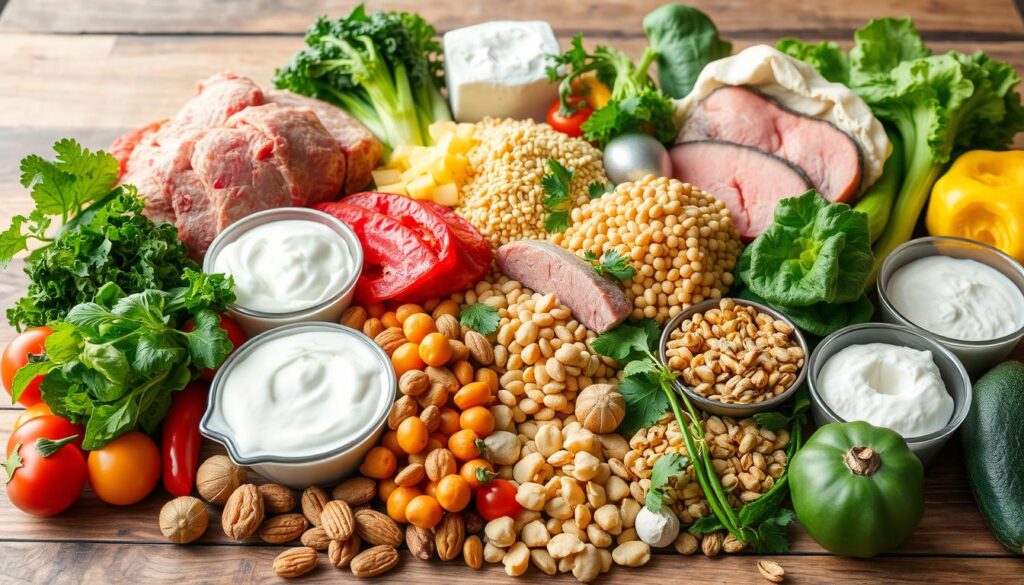
- Chicken breast: 26.7 g of protein per half breast
- Salmon: 30.5 g of protein per half fillet
- Lentils: 9.02 g of protein per 100 g
- Greek yogurt: 19.9 g of protein per 7-ounce container
- Turkey breast: 25.6 g of protein per 3-ounce serving
| Food | Protein Content |
|---|---|
| Eggs | 6.3 g per large egg |
| Almonds | 6 g per 1-ounce serving |
| Cottage cheese | 28 g per cup |
| Whey protein powder | 16.6 g per scoop |
How Much Protein Do You Need?
To figure out how much protein you need, look at your age, sex, weight, and how active you are. The usual amount is about 0.8 grams per kilogram of body weight. But, your needs might be different. For instance, adult men should aim for 56 grams of protein a day. Women should go for at least 46 grams.
Eating protein-rich snacks and watching your portion sizes can help you meet your protein goals. Studies show eating more protein than needed can help with losing weight and keeping muscle. Protein takes more energy to digest than carbs or fat, which is good for burning calories.

A diet high in protein for losing weight or for athletes should have 1.2–2 grams of protein per kilogram of body weight. Here’s a simple guide to daily protein intake:
| Category | Recommended Daily Protein Intake |
|---|---|
| Sedentary | 0.8 grams per kilogram of body weight |
| Active | 1.2-2.0 grams per kilogram of body weight |
| Athlete | 1.6-2.2 grams per kilogram of body weight |
Always talk to a healthcare professional or a registered dietitian to find out the right amount of protein for you.
Benefits of a High-Protein Diet for Weight Loss
A high-protein diet can help you lose weight by making you feel full and boosting your metabolism. Protein takes more energy to digest, which means you burn more calories. It also helps keep your muscles strong, which aids in weight loss. Eating a balanced diet with enough protein can lead to noticeable weight loss.
Some key benefits of a high-protein diet for weight loss include:
- Reducing appetite and increasing feelings of fullness
- Boosting metabolism and burning more calories
- Preserving muscle mass and promoting muscle gain
Reducing Appetite
A high-protein diet can control hunger by balancing appetite hormones. This can lower your calorie intake, helping you lose weight. Aim for at least 1.5 grams of protein per kilogram of body weight for this benefit.
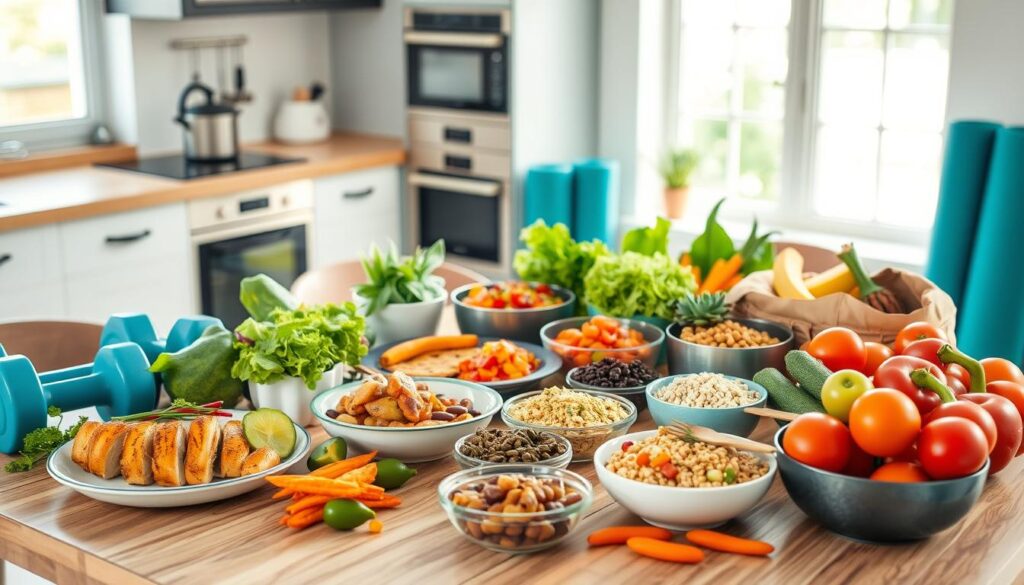
Boosting Metabolism
Protein also boosts your metabolism by requiring more energy to digest. This can increase calorie burn, leading to weight loss. A high-protein diet with healthy meals and a balanced diet can help you lose weight and stay healthy.
| Protein Source | Protein Content (g) |
|---|---|
| Chicken breast | 30-40 |
| Lean beef | 25-35 |
| Fish | 20-30 |
High-Protein Diets and Muscle Gain
To build and keep muscle, a high-protein diet is key, paired with strength training. It’s important to have a meal plan that includes protein-rich foods and supplements at the right time. Protein timing is crucial for muscle recovery and growth.
Studies show you need 1.4–2 grams of protein for each kilogram of body weight daily for muscle building. Include foods like salmon, chicken breast, Greek yogurt, and lean beef in your diet. Also, amino acids are important for muscle growth and repair. You can find them in cottage cheese, turkey breast, and soybeans.
Effective Meal Plan Strategies
A good meal plan balances protein, carbs, and healthy fats. Here are some high-protein foods:
- Chicken breast: 26.7g of protein per 3-ounce serving
- Salmon: 17g of protein per 3-ounce serving
- Greek yogurt: 20g of protein per 6-ounce serving
- Lean beef: 22g of protein per 3-ounce serving
Timing Your Protein Intake
Workout recovery is vital for muscle gain. Eating protein after a workout helps with muscle growth and repair. Try to eat 15-20 grams of protein within 30-60 minutes after your workout.
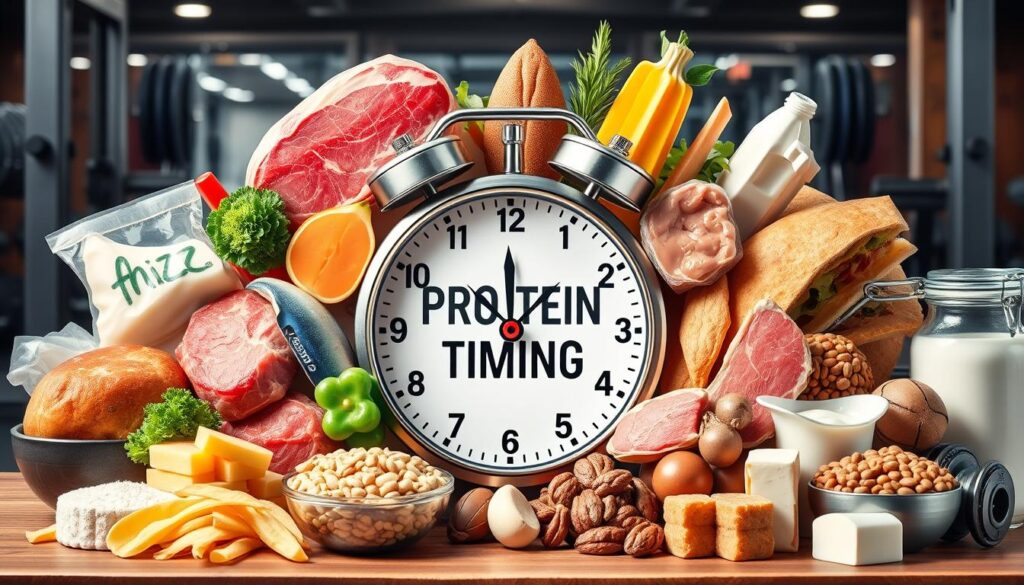
| Food | Protein Content (per serving) |
|---|---|
| Chicken breast | 26.7g (3-ounce serving) |
| Salmon | 17g (3-ounce serving) |
| Greek yogurt | 20g (6-ounce serving) |
| Lean beef | 22g (3-ounce serving) |
Planning Your High-Protein Meals
Planning high-protein meals is key. You want to focus on healthy meals that are high in protein but low in bad fats and sugars. Start by eating clean and include many protein-rich foods.
Having a good meal prep plan is crucial. It helps you stay on track and get enough protein all day. Here are some tips to help you:
- Add protein-rich snacks like Greek yogurt or hard-boiled eggs to your day.
- Plan your meals ahead to get a good mix of protein, healthy fats, and carbs.
- Think about talking to a nutritionist or dietitian for a meal plan that fits you.
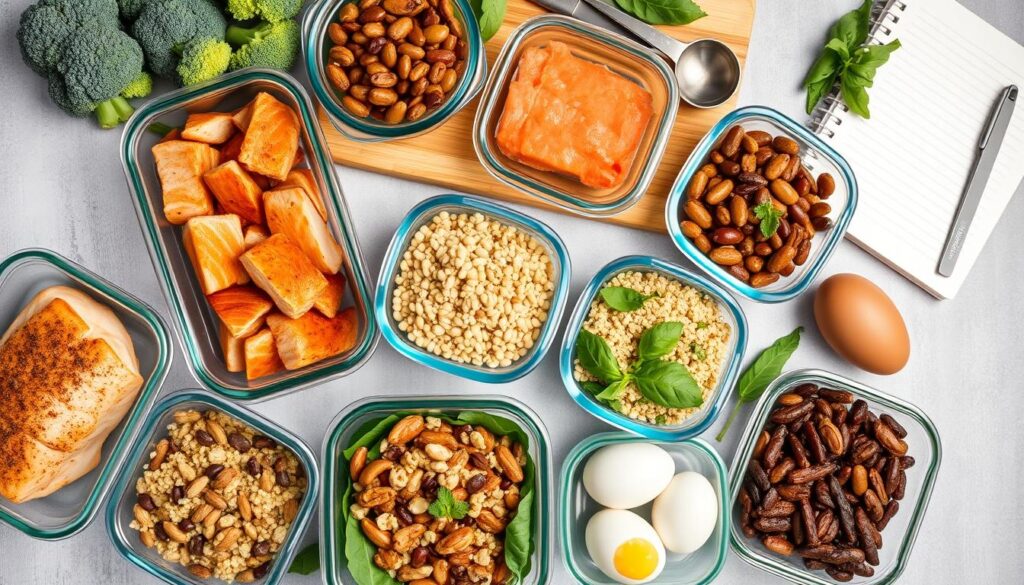
By following these tips and adding protein-rich snacks and healthy meals to your diet, you’ll get the nutrients you need. This supports your health and fitness goals.
| Food | Protein Content |
|---|---|
| Greek yogurt | 10 grams per cup |
| Chicken breast | 31 grams per 3.5-ounce serving |
| Hard-boiled egg | 7 grams per large egg |
Potential Risks of a High-Protein Diet
A high-protein diet is good for fitness fans, but it has risks. One big worry is kidney health. A diet high in protein might stress the kidneys. Studies say it’s okay for healthy kidneys, but not for those with kidney disease.
To keep a nutritional balance, plan your high-protein diet well. Use healthy recipes that mix protein with other important nutrients. Here are some tips:
- Eat 20 to 30 grams of protein at each meal, or 60 to 90 grams all day.
- Don’t eat too much red meat, as it might raise colon cancer risk.
- Watch your calorie intake, as too much protein can be harmful.
Knowing these risks and balancing your diet can help. This way, you can enjoy a high-protein diet safely. Always talk to a doctor or dietitian to find what’s best for you.
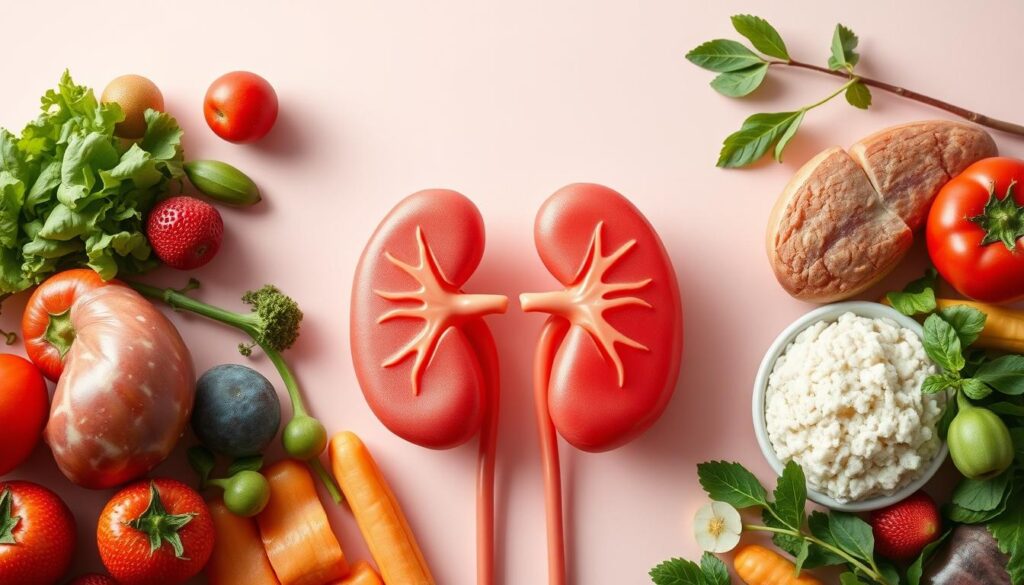
| Study | Findings |
|---|---|
| Hypercalciuria study | Observed disorder related to high protein intake in 11 healthy adults |
| Renal function study | Accelerated decline in renal function in women with mild renal insufficiency due to high protein intake |
Combining Protein with Other Nutrients
A balanced diet is key for health and fitness. It should include protein, carbs, and healthy fats. This mix helps with feeling full and boosts metabolism. A study showed that high-protein diets with exercise can change body weight and fat.
Carbs give energy for workouts. Healthy fats help with hormones and health. Eating all three macronutrients aids in weight management and health. For instance, a study on middle-aged adults with obesity found that high-protein diets and exercise improved insulin sensitivity and body shape.
Carbohydrates for Energy
Carbs are vital for energy. They are simple or complex. Simple carbs, like sugars, give quick energy. Complex carbs, like whole grains, offer sustained energy.
Healthy Fats for Balanced Nutrition
Healthy fats, found in nuts, seeds, and avocados, are crucial for hormones and health. They also help with vitamin and mineral absorption. A diet rich in healthy fats supports weight management and overall health.
| Nutrient | Function | Food Sources |
|---|---|---|
| Carbohydrates | Energy | Whole grains, fruits, vegetables |
| Protein | Muscle growth and repair | Lean meats, fish, eggs, dairy |
| Healthy Fats | Hormone production and absorption of vitamins and minerals | Nuts, seeds, avocados |
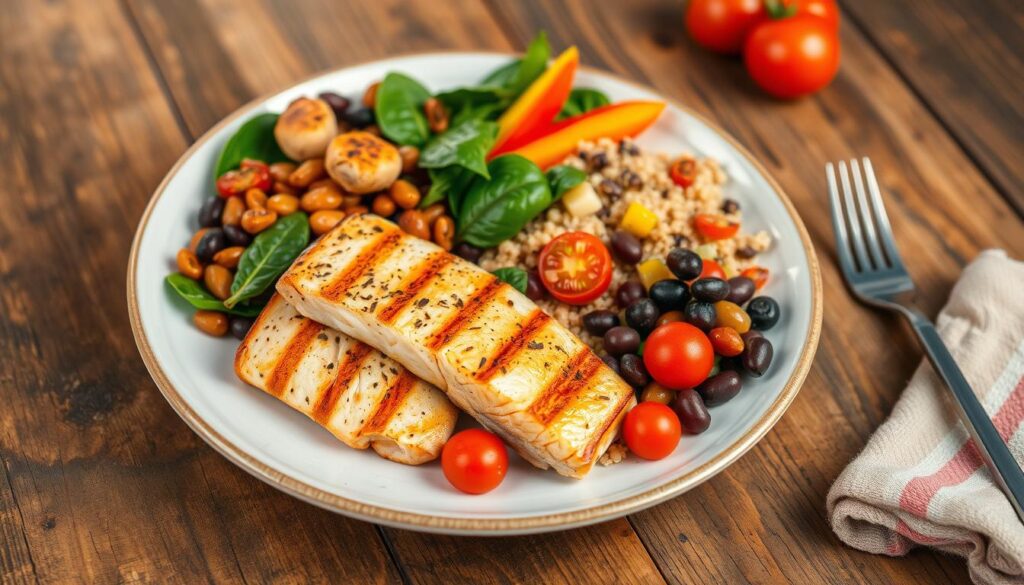
The Role of Protein in Recovery
Protein is key for workout recovery because it fixes and grows muscle. After exercising, eating protein-rich foods or taking supplements is vital. This helps with muscle recovery and lessens soreness. When you eat protein is just as important as what you eat.
A study showed that 20 grams of protein right after working out is best for building muscle. The type of protein you eat after working out also matters. Amino acids, like essential ones, are crucial for muscle growth. You can find these in good protein sources like lean meats, fish, and eggs.
Good post-workout nutrition means eating protein-rich foods or supplements soon after. This boosts muscle growth and recovery. It also cuts down on soreness and tiredness. Remember, how much protein you need can change based on how hard and long you work out.

| Protein Source | Essential Amino Acids |
|---|---|
| Lean Meats | High |
| Fish | High |
| Eggs | High |
Popular High-Protein Diets
For those into fitness, a diet rich in protein is key. It helps boost athletic performance. But, it’s important to know the truth about high-protein diets. Diets like Atkins and Zone are popular among fitness fans.
A high-protein diet means getting at least 30% of your calories from protein. It’s important to have enough protein at every meal. Foods like chicken breast, eggs, and shrimp are great sources, with 75%, 35%, and 95% protein, respectively.
Examples of Diet Plans
- The Atkins diet: a low-carb, high-protein diet that limits carbs
- The Zone diet: a balanced diet that aims for 30% of daily calories from protein
Pros and Cons
High-protein diets can help with weight loss and muscle gain. But, they might lower carb intake, affecting energy during long activities. Yet, they can also help keep muscle, reduce hunger, and improve body shape.
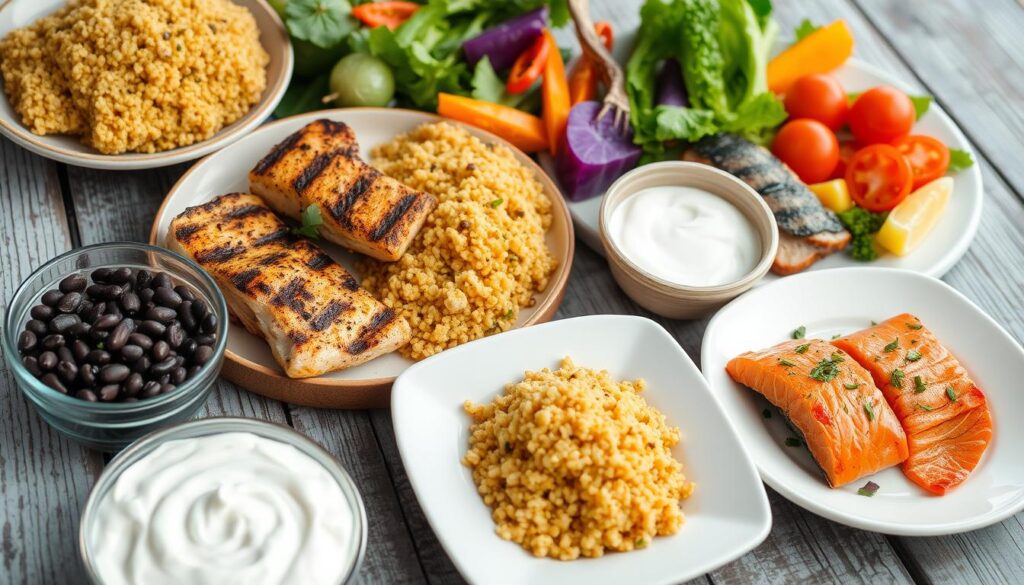
Choosing the right diet is crucial. It should match your needs and goals. Always talk to a nutritionist or dietitian to make sure you get the right nutrients for top athletic performance.
Is a High-Protein Diet Right for You?
Starting your fitness journey means thinking about a high-protein diet. It can help with muscle growth and weight loss. But, it’s not for everyone. You should think about your goals, lifestyle, and health before changing your diet.
For advice, talk to a registered nutritionist or dietitian. They can look at your diet, activity level, and health. Then, they’ll suggest a diet plan that fits your fitness goals. This way, you get the nutrients you need and stay healthy.
Don’t follow a diet that doesn’t fit you. Make your high-protein diet personal to your needs and health. With the right help, a high-protein diet can help you reach your fitness goals.





















